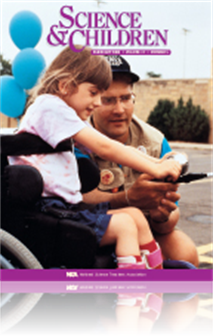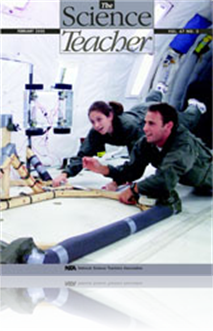All Resources
Journal Article
Putting a Spring in Archimedes’ Step
As teachers with often limited resources, we are constantly looking for ways to promote serious science at low cost and with minimal equipment. This activity helps students to understand buoyancy and targets important science and math concepts while ...
Journal Article
Find Out Why: Use this program during this year's National Science and Technology Week
Find Out Why is the flagship publication of the National Science Foundation’s (NSF) Science and Engineering Outreach Programs. Each issue asks a question that is shaped around children’s interests and explores questions of science, engineering, ...
Journal Article
In this outdoor classroom adventure, students learn to work cooperatively when facing challenges during overnight camping trips. Perhaps most importantly, students gain direction and purpose in their lives. They also gain self-assurance, which in tur...
Journal Article
On August 11, 1999, the Kansas State Board of Education voted six to four to remove references to cosmology and evolution from the state’s education standards and assessments. However, the author believes that students need to study the empirical e...
Journal Article
Blue Solids, Red Liquids, and Yellow Gases
During this eye-opening unit, students create visual representations of some very abstract concepts, and in the process eliminate many of their misconceptions about matter. All you need are some colored pencils and photocopies of the worksheets inclu...
Journal Article
Photographing Wildlife: Observing wildlife with an inexpensive camera
This activity can produce meaningful learning by improving students' skills in planning, problem solving, and decision making, as well as to serve as a natural springboard for journal and story writing. A great project for involving parents....
Journal Article
Teaching Teachers: Standards Direct Preservice Teacher Portfolios
Portfolios provide an opportunity and a structure for teachers to document and describe their teaching, articulate professional knowledge, and reflect on what, how, and why they teach. In this article, a required portfolio became the most logical ans...
Journal Article
Students need to understand that science problems have more than one possible solution. Therefore, incorporating hands-on problem solving activities is necessary. Students benefit every time they perform investigations and make connections between sc...
Journal Article
The Meteor Scatter Project, a replication of a NASA funded project carried out by Anthony Mallama, is a system capable of recognizing meteor activity in a specified section of our atmosphere. The activity is graphically chronicled through a series of...
Journal Article
Guest Editorial: Computers in the Year 2000
An opinion piece about the millennium computer bug or year 2000 problem (Y2K) that could cause computer systems to crash....
Journal Article
Once students become aware that science is something that most of us “do” daily, they are more apt to want to do science themselves. To encourage students, the author developed a laboratory experiment that introduces them to scientific inquiry, s...
Journal Article
Idea Bank: Sun's Rays Strike Earth
The Idea Bank provides tips and techniques for creative teaching, in about 1,000 words. This month’s Idea Bank features tips for explaining the angle at which the Sun's rays strike the Earth's surface....
Journal Article
The Case Study: And All That Jazz—An Essay Extolling the Virtues of Writing Case Teaching Notes
This column provides original articles on innovations in case study teaching, assessment of the method, as well as case studies with teaching notes. This article provides information on how to write, including an outline for writing, case teaching no...
Journal Article
Action research is one of the fastest growing directions of staff development (Webb, 1996). This article describes how the author used the Constructivist Learning Environment Survey (CLES) (Taylor et al, 1997) to gather data in a reflective analysis ...





